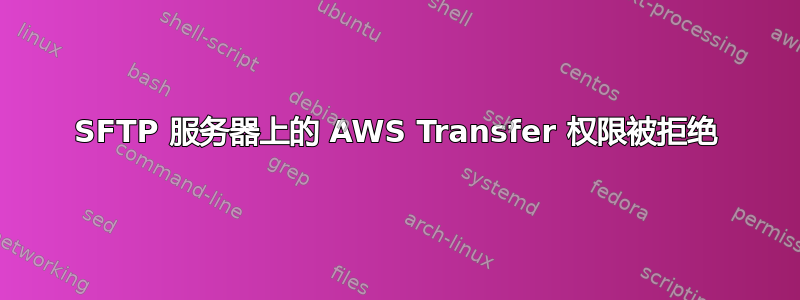
我可以使用 cyberduck 或 filezilla 登录我的服务器,但无法读取我的主目录。s3 bucket"mybucket"存在。在 cyber duck 中我看到
"Cannot readdir on root. Please contact your web hosting service provider for assistance." and in Filezilla "Error: Reading directory .: permission denied"
即使我可以连接到服务器。
我是否遗漏了一些策略中的用户权限以下 ?
这些是我的权限
{
"Version": "2012-10-17",
"Statement": [
{
"Sid": "VisualEditor0",
"Effect": "Allow",
"Action": [
"s3:ListBucket",
"s3:GetBucketLocation"
],
"Resource": "arn:aws:s3:::MYBUCKET"
},
{
"Sid": "VisualEditor1",
"Effect": "Allow",
"Action": [
"s3:PutObject",
"s3:GetObject",
"s3:DeleteObject"
],
"Resource": "arn:aws:s3:::MYBUCKET/*"
},
{
"Sid": "VisualEditor2",
"Effect": "Allow",
"Action": "transfer:*",
"Resource": "*"
}
]
}
这些是我的信任关系:
{
"Version": "2012-10-17",
"Statement": [
{
"Effect": "Allow",
"Principal": {
"Service": "s3.amazonaws.com"
},
"Action": "sts:AssumeRole"
},
{
"Effect": "Allow",
"Principal": {
"Service": "transfer.amazonaws.com"
},
"Action": "sts:AssumeRole"
}
]
}
答案1
用户角色应该是:
{
"Version": "2012-10-17",
"Statement": [
{
"Sid": "AllowListingOfUserFolder",
"Action": [
"s3:ListBucket",
"s3:GetBucketLocation"
],
"Effect": "Allow",
"Resource": [
"arn:aws:s3:::BUCKET_NAME"
]
},
{
"Sid": "HomeDirObjectAccess",
"Effect": "Allow",
"Action": [
"s3:PutObject",
"s3:GetObject",
"s3:DeleteObjectVersion",
"s3:DeleteObject",
"s3:GetObjectVersion"
],
"Resource": "arn:aws:s3:::BUCKET_NAME/*"
}
]
}
用户的信任关系:
{
"Version": "2012-10-17",
"Statement": [
{
"Sid": "",
"Effect": "Allow",
"Principal": {
"Service": "transfer.amazonaws.com"
},
"Action": "sts:AssumeRole"
}
]
}
您的用户的主目录应该是 /BUCKET_NAME
答案2
s3:GetObject在我向策略中添加权限之前,我遇到了这个问题aws_transfer_user。我原以为s3:ListBucket会足够,但事实并非如此。sftp> ls直到我获得 GetObject 后才会失败。
这是它的 Terraform:
resource "aws_transfer_user" "example-ftp-user" {
count = length(var.uploader_users)
user_name = var.uploader_users[count.index].username
server_id = aws_transfer_server.example-transfer.id
role = aws_iam_role.sftp_content_incoming.arn
home_directory_type = "LOGICAL"
home_directory_mappings {
entry = "/"
target = "/my-bucket/$${Transfer:UserName}"
}
policy = <<POLICY
{
"Version": "2012-10-17",
"Statement": [
{
"Sid": "AllowSftpUserAccessToS3",
"Effect": "Allow",
"Action": [
"s3:ListBucket",
"s3:PutObject",
"s3:GetObject",
"s3:DeleteObjectVersion",
"s3:DeleteObject",
"s3:GetObjectVersion",
"s3:GetBucketLocation"
],
"Resource": [
"${aws_s3_bucket.bucket.arn}/${var.uploader_users[count.index].username}",
"${aws_s3_bucket.bucket.arn}/${var.uploader_users[count.index].username}/*"
]
}
]
}
POLICY
}
我在.tfvars文件中定义用户;例如:
uploader_users = [
{
username = "firstuser"
public_key = "ssh-rsa ...."
},
{
username = "seconduser"
public_key = "ssh-rsa ..."
},
{
username = "thirduser"
public_key = "ssh-rsa ..."
}
]
我希望这对某些人有帮助。我花了很多功夫才最终让它工作起来,而且我不能 100% 确定与其他策略的交互最终是否会起作用。但应用这个之后,我就可以连接并列出存储桶内容,而不会收到“权限被拒绝”的提示。


